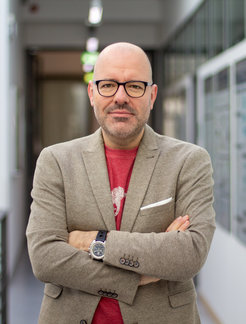Special Honour for Max Planck Researcher Stefan Raunser
Prof. Dr. Stefan Raunser from the Max Planck Institute of Molecular Physiology in Dortmund has been elected to the North Rhine-Westphalian Academy of Sciences, Humanities and Arts due to his exceptional scientific achievements. In doing so, the academy is recognizing Raunser’s outstanding contribution in the field of structural biology, marking his second time being appointed to the Academy as he was previously admitted to the Academy's Young College as a junior scientist. This is the first time a scientist has received this prestigious double honour.

Stefan Raunser, a structural biochemist, is Adjunct Professor at the Faculty of Chemistry and Biology at the TU Dortmund University and has been the Director of the Department of Structural Biochemistry at the Max Planck Institute in Dortmund since 2014. Raunser’s focus in the field of structural biology lies in analyzing the structure and function of proteins in order to gain a molecular understanding of fundamental cellular processes. Using the Nobel Prize-winning method of cryo electron microscopy, he has achieved groundbreaking success in hitherto unknown mechanisms of action of bacterial toxins and has elucidated the interplay of biomolecules in muscle contraction. Amongst multiple achievements, Raunser’s group is the first to uncover the 3D structure of the smallest functional unit of the muscle, the sarcomere. Raunser has been a member of the scientific organization EMBO since 2018 and of the prestigious German National Academy of Sciences Leopoldina. since 2019; thus belonging to the circle of particularly outstanding researchers in Europe.
The North Rhine-Westphalian Academy of Sciences, Humanities and Arts was founded in 1970. In addition to the sciences, it is the only German academy to integrate the arts since 2008 in recognition of exceptional researchers and artists. The Academy offers members the platform to engage in academic dialogue amongst themselves as well as wit scientific and cultural institutions at home and abroad. Membership remains exclusive to scientists and artists who have "distinguished themselves through scientific or artistic achievements". At present, the Academy has around 270 full members and almost 140 corresponding members.
